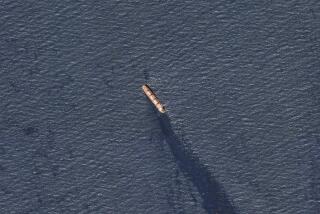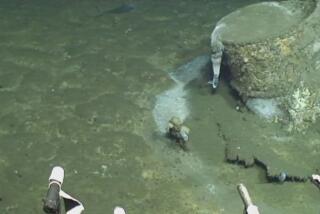Russian Nuclear Waste Sparks Feud : Asia: Japan is angry after Moscow dumps toxic liquid in nearby waters.
- Share via
TOKYO — Less than one week after troubled neighbors Japan and Russia signed new friendship pacts, the two sides were feuding again Monday after Russia admitted dumping 900 tons of liquid nuclear waste in the Sea of Japan over the weekend.
Japan demanded a permanent halt to the dumping, but Moscow said it has nowhere to store the waste, mostly low-radiation cleansing fluid and coolant from a ship-repair facility near Vladivostok for its aging fleet of nuclear-powered submarines.
Storage tankers stationed off the coast were dangerously overflowing and had to be emptied urgently, Russian officials said.
Moscow also said the waste is not hazardous.
A Japanese government study last year found that Russia’s previous ocean dumping had had no effect on Japan or the surrounding marine environment.
But the latest incident, first reported Sunday by the environmental group Greenpeace, violates a 1983 international moratorium on ocean dumping and sparked wide protest in Japan.
The Japanese indignation was heightened by the fact that just last week Russian President Boris N. Yeltsin and Japanese Prime Minister Morihiro Hosokawa met in Tokyo and signed a spate of new agreements pledging increased cooperation and friendship.
The two leaders had specifically agreed to jointly study the ocean dumping problem but never reached an agreement to stop it.
Indeed, Moscow had forewarned Tokyo in May that dumping will continue until 1997.
“I asked him to stop, but there was no agreement to stop,” Hosokawa said Monday. He called the action “extremely regrettable.”
In Moscow, the Interfax news agency quoted Russian Deputy Environment Minister Amirkhan Amirkhanov as saying governments and international organizations had been warned in advance.
“Everything was carried out according to international norms,” he said.
The International Atomic Energy Agency in Vienna, the world’s nuclear watchdog, said Moscow informed the U.N. agency of its intentions by letter Oct. 7.
IAEA spokesman Hans Meyer also said the same letter was sent to the International Maritime Organization in London. But Chief Cabinet Secretary Masayoshi Takemura said Japan had not been notified.
The government’s first report came from Greenpeace, which had been trailing the Russian convoy of three vessels for 24 hours and measured surrounding radiation at 10 times normal levels.
Greenpeace crew member John Sprange said it was clear that liquid waste was being pumped directly from the ship to the sea.
“The Russian navy will sacrifice the marine environment to keep their nuclear submarines at sea,” Sprange said.
Russian officials said an overloaded storage tanker near the coast fell into disrepair and was in danger of sinking, so they had to transfer the waste to another tanker. But that tanker was also full, so the waste had to be quickly dumped at sea.
Despite Japan’s protest, Russian officials said a second load was being dumped into the Sea of Japan on Monday night.
The Russian government admitted for the first time in March that it and its Soviet predecessor had dumped radioactive waste in the Sea of Japan, the Sea of Okhotsk, the North Pacific and the Barents Sea between 1959 and 1992. It also admitted that at least two solid nuclear reactors had been dumped in the sea.
Dozens of protesters demonstrated in front of the Russian Embassy in Tokyo on Monday and demanded an end to the dumping.
More to Read
Sign up for Essential California
The most important California stories and recommendations in your inbox every morning.
You may occasionally receive promotional content from the Los Angeles Times.














